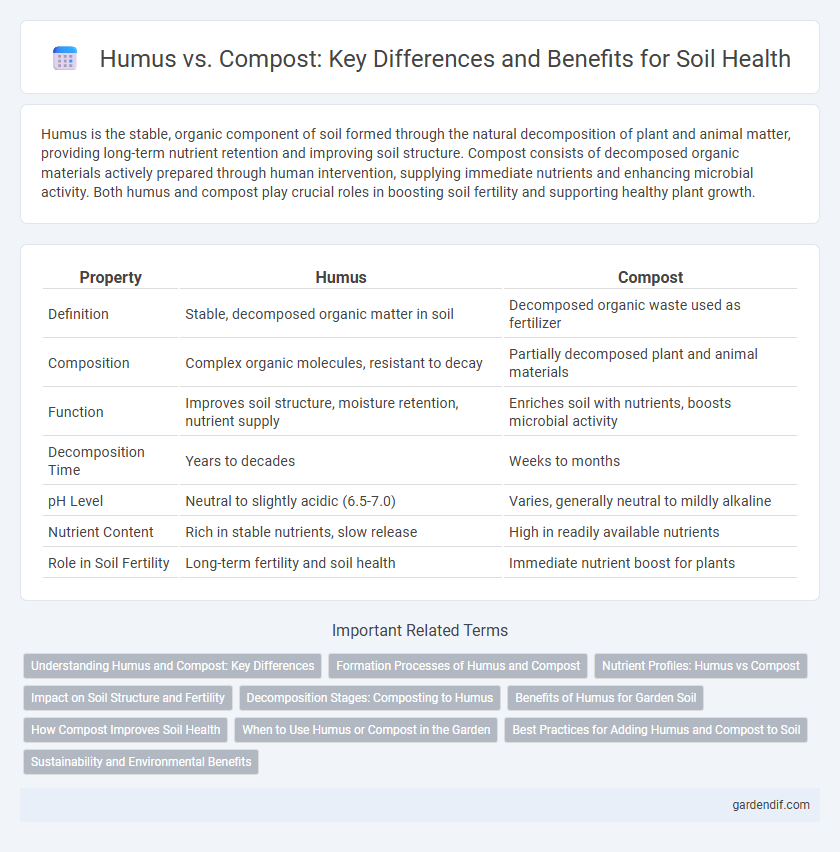
Humus vs Compost Illustration
Humus is the stable, organic component of soil formed through the natural decomposition of plant and animal matter, providing long-term nutrient retention and improving soil structure. Compost consists of decomposed organic materials actively prepared through human intervention, supplying immediate nutrients and enhancing microbial activity. Both humus and compost play crucial roles in boosting soil fertility and supporting healthy plant growth.
Table of Comparison
| Property | Humus | Compost |
|---|---|---|
| Definition | Stable, decomposed organic matter in soil | Decomposed organic waste used as fertilizer |
| Composition | Complex organic molecules, resistant to decay | Partially decomposed plant and animal materials |
| Function | Improves soil structure, moisture retention, nutrient supply | Enriches soil with nutrients, boosts microbial activity |
| Decomposition Time | Years to decades | Weeks to months |
| pH Level | Neutral to slightly acidic (6.5-7.0) | Varies, generally neutral to mildly alkaline |
| Nutrient Content | Rich in stable nutrients, slow release | High in readily available nutrients |
| Role in Soil Fertility | Long-term fertility and soil health | Immediate nutrient boost for plants |
Understanding Humus and Compost: Key Differences
Humus is a stable, nutrient-rich organic matter that results from the complete decomposition of plant and animal residues, enhancing soil structure and fertility over the long term. Compost, on the other hand, is partially decomposed organic material actively used to enrich soil and promote microbial activity during gardening or farming. Understanding the difference between humus and compost is crucial for effective soil management and sustainable agriculture practices.
Formation Processes of Humus and Compost
Humus forms through the slow decomposition of organic matter by soil microorganisms, creating a stable, dark substance that enriches soil structure and nutrient retention. Compost results from the controlled, aerobic decomposition of organic waste under optimal temperature and moisture conditions, producing nutrient-rich material more rapidly. Both processes involve microbial activity but differ in time scale, environmental control, and the chemical stability of the final product.
Nutrient Profiles: Humus vs Compost
Humus is a stable, dark organic matter rich in carbon and micronutrients that enhances soil structure and water retention, while compost contains a more diverse and readily available blend of macronutrients like nitrogen, phosphorus, and potassium essential for immediate plant growth. Nutrient profiles of humus show slower nutrient release due to its complex organic compounds, contrasting with the faster nutrient cycling found in compost. Compost also introduces beneficial microorganisms that accelerate nutrient breakdown, providing an accessible nutrient supply compared to the long-term soil enrichment offered by humus.
Impact on Soil Structure and Fertility
Humus significantly enhances soil structure by improving aggregation, water retention, and aeration, creating a stable habitat for beneficial microbes. Compost contributes nutrients and organic matter that stimulate microbial activity and nutrient cycling, thereby boosting soil fertility and plant growth. Both humus and compost increase soil organic carbon, but humus provides more long-term soil stability and nutrient reservoir.
Decomposition Stages: Composting to Humus
Composting involves the initial stages of organic matter decomposition, where microorganisms break down fresh plant and animal residues into simpler compounds, producing heat and carbon dioxide. During humus formation, this material undergoes further biochemical transformation, resulting in a stable, nutrient-rich substance with a complex structure that enhances soil fertility. Humus differs from compost primarily by its resistance to further decomposition and its ability to retain moisture and nutrients, contributing to long-term soil health.
Benefits of Humus for Garden Soil
Humus enhances garden soil by improving nutrient retention, moisture absorption, and soil structure, promoting healthier plant growth. Its rich organic matter supports beneficial microbial activity, which accelerates nutrient cycling and disease suppression. Unlike compost, humus is more stable and long-lasting, providing sustained fertility and resilience to soil erosion.
How Compost Improves Soil Health
Compost enhances soil health by increasing organic matter content, which improves soil structure and water retention. It introduces beneficial microbes and nutrients that boost microbial activity and nutrient cycling, promoting plant growth. Unlike humus, compost is a dynamic, actively decomposing material that continuously enriches the soil ecosystem.
When to Use Humus or Compost in the Garden
Humus is ideal for long-term soil enrichment as it improves soil structure, water retention, and nutrient availability over time, making it perfect for established garden beds. Compost is best used during planting or seasonal soil preparation to provide an immediate nutrient boost and stimulate microbial activity, supporting young plants and fast growth. Applying humus and compost together maximizes soil fertility by combining stable organic matter with fresh nutrients for optimal garden health.
Best Practices for Adding Humus and Compost to Soil
Incorporating humus into soil improves structure, enhances nutrient retention, and supports microbial activity by adding stable organic matter that decomposes slowly. Compost should be applied regularly in thin, even layers to avoid nutrient imbalances and promote a healthy, diverse soil ecosystem. Best practices involve mixing humus deeply into the soil for long-term benefits, while compost is best used as a top dressing or mulch to supply readily available nutrients and moisture retention.
Sustainability and Environmental Benefits
Humus is a stable, organic component of soil formed through long-term decomposition, enhancing soil fertility and carbon sequestration, which supports sustainable agriculture by reducing the need for chemical fertilizers. Compost consists of decomposed organic waste that improves soil structure, moisture retention, and nutrient availability while diverting organic waste from landfills, thus lowering greenhouse gas emissions. Both humus and compost contribute to environmental benefits by promoting soil health, increasing biodiversity, and mitigating climate change impacts through natural carbon cycling.
Humus vs Compost Infographic

 gardendif.com
gardendif.com